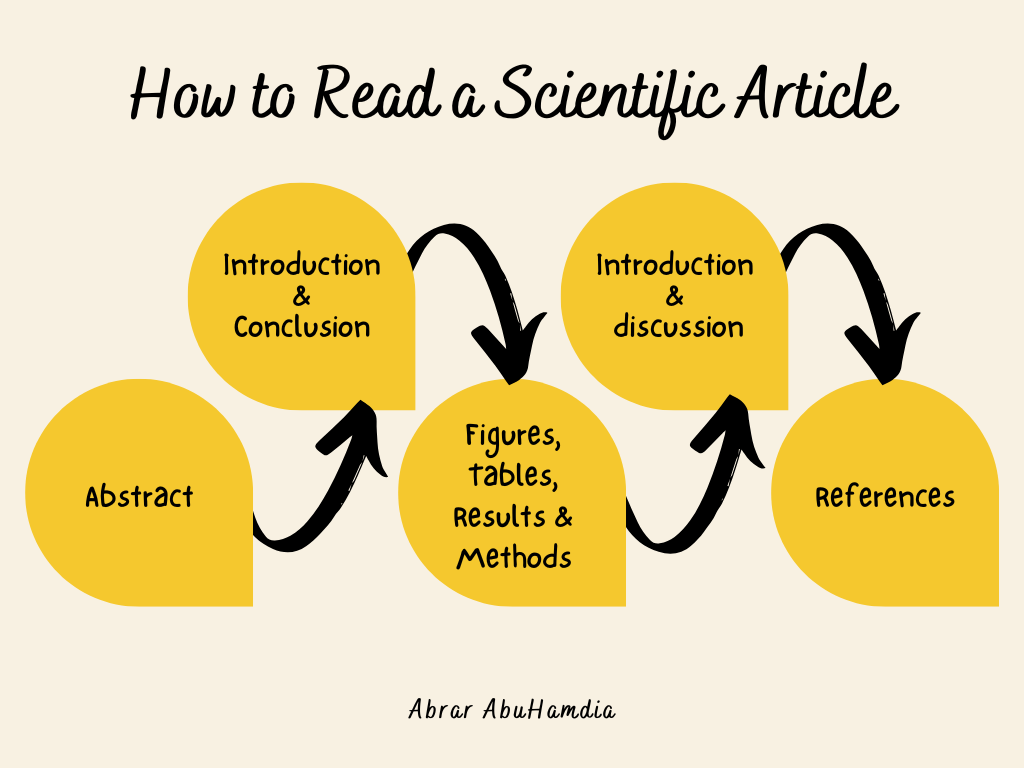How to Read Scientific Article Effectively?
By Abrar AbuHamdia
The world is brimming with mysteries waiting to be found; yet, before launching on your journey of discovery, you must first learn, which you can't accomplish without reading. Reading is the starting point of learning; now that you have the knowledge, you can put it to use to explore the world and discover its hidden treasures. In this essay, I will discuss how to read scientific papers effectively.
Before you start poring over text, keep in mind that scientific papers often follow a standard structure that includes sections such as the abstract, introduction, methodology, results, discussion, and conclusion. Everyone agrees that the abstract part should be read first to get a sense of the overall topic. The issue of "what to read next?" is, however, arguable. In this essay, I will demonstrate the strategy I use and tips I follow to read articles. So let us get started…
Here is a map of the paths I take while reading scientific papers.
Guidelines for Effective Article Reading
1. Read the Title and the Abstract
The title and abstract are your initial stepping stones into the article. The title captures the core of the study in a few words. The abstract gives a succinct description of the objectives, methodology, results, and conclusions of the study. They provide you with an overview of the article, assisting you in determining whether the article is relevant to your topic of interest and worth further investigation.
2. Read the Introduction and Conclusion
The introduction offers you an overview of the topic, the significance of the study, gaps in the literature, and the study's aims and objectives, which answer how researchers will meet the aim. It helps you comprehend the study's purpose and significance, and it provides a road map for what to expect in terms of methodology, results, and conclusions. The conclusion highlights the most key findings and implications. It helps you swiftly assess the research's relevance and significance, as well as the potential implications for your own work or field. Finally, these parts allow you to assess the research's quality and general coherence. You can determine how well the study's questions and objectives were addressed.
3. Skimming and Scanning
Skim the article to get familiar with the article structure and grasp the main points, paying attention to headings, subheadings, and figures. Scan the text for keywords or phrases that are related to your topic. This method assists you in identifying relevant sections of the article while evaluating its relevance to your research.
4. Reading with a Purpose
Approach scientific papers with a specific goal in mind: Identify the information you're looking for. This targeted method allows you to read selectively, saving time and ensuring you extract the most relevant data.
5. Critical Evaluation of Methods
To evaluate the study's quality, read the methods section and examine the design of the study, sample size, data gathering techniques, and statistical analyses. Be aware of potential biases and conflicts of interest that may impair the results' reliability and validity. I understand that it is not an easy move, especially for beginners. You continually enhance your evaluation skills as you explore literature and become more aware of study methodology and potential limits.
6. Taking and Annotating Notes
Develop the practice of taking notes and annotating relevant areas while reading scientific literature. Highlight major findings, methodology, and any questions or ideas that come to mind. Taking notes and summarizing the content in your own words will help you grasp the issue better and retain your information. Record your observations using tools such as digital note-taking applications or traditional pen and paper.
7. Checking References and Citations
The final section of scientific articles is titled "references." In this section, you detail all of the sources you used in your research. These references are excellent starting points for additional research. Take note of the cited literature because it provides extra context and potentially relevant research.
Finally, I'd like to offer you some advice. Read and discuss research papers with peers and mentors, and never be afraid to request clarification from them. Discuss the study's weaknesses as well to improve your critical thinking skills. Overall, these techniques will improve your reading skills, broaden your perspective, and help you grasp the research issue better. You are now ready to begin your amazing research adventure. Happy reading, and may your discoveries pave the path for a more promising future in medicine.
Thank you for taking the time to read my essay. If you found this essay insightful, please share it with your community.
Subscribe me to receive fresh content about scientific research.


